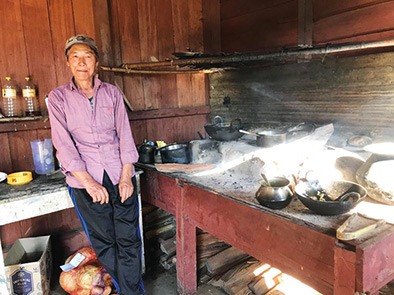Monday Musing
[ Tongam Rina ]
Yosu Yobin is the caretaker of the PWD guesthouse in Vijaynagar who doubles up as a cook. His cooking skills are frustratingly terrible, but the effort he makes to put food together for the guests in a place where very few vegetables grow in winter is something.
A man of few words, his constant companion is a walkie-talkie. “Kal meat milega,” he announced one evening while we were in the smoky kitchen, trying to make chutney out of a rotten tomato and half dried green chilies flown in from Miao by police personnel on duty, and fresh laipatta that he grows near the kitchen.
How do you know? I asked.
He pointed to his constant companion. Someone was planning to sell meat and had conveyed it on the walkie-talkie. Till I was in Vijaynagar, I had no idea that a walkie-talkie could be used as mode of daily communication. In the absence of phone connection, it’s the only way one can communicate.
The whole village listens to the conversation if they are tuned in, so they know where pork is being sold, who had a child, and who was waiting for whom!
Of the 16 channels, each village is assigned a channel. The gaon burahs and Buris have a different channel. I was informed that there are no Gaon Buris in Vijaynagar circle. You tune in to any channel and get the latest conversations or updates.
While my friend – a researcher – and I walked from Vijaynagar to Gandhigram, which is a five-hour long walk, we met many people who stopped to confirm if we were the same researcher and reporter that they had heard about in walkie-talkie conversations.
Uncle Yosu had made a call to our host in Gandhigram on the walkie-talkie regarding our arrival time, so the people who tuned in at that time knew about us.
Sometimes they broadcast Christian devotional songs, using a mobile device. There is no communication whatsoever, and the only mode of communication is through the BSNL, which has put up a tower in Vijaynagar but the line stayed disconnected during our stay, following violence and burning down of government establishments.
The BSNL set up a 2G tower in August 2020. The villagers say that it does not work half the time, and even if it does, call drops after 13 seconds, forcing many to instead visit VSAT cafes for internet-based calls, much like the PCOs of earlier times.
In almost all the villages there is a VSAT.
The one in Vijaynagar has a long queue. There are three phones and the waiting period could be upto half an hour as security personnel and police personnel make calls. A call to Andhra Pradesh, taking an update on aged parents; a call to West Bengal, talking about holidays; Arunachalees getting an update about the exam date. You keep looking at the floor or fiddle with the phone or mentally switch off because you don’t want to be privy to conversations. But one has to shout and wait to be heard because the signal is mostly weak. There is no time to worry about privacy. The priority is getting connected even if 10 other people are listening to that conversation.
Any call, outgoing or incoming, costs Rs 10.



